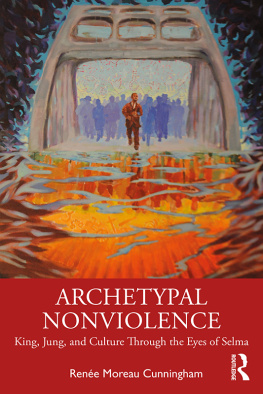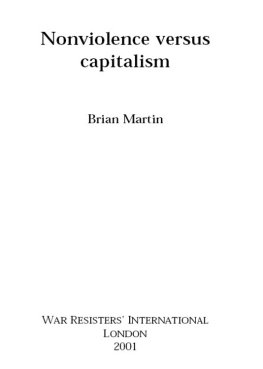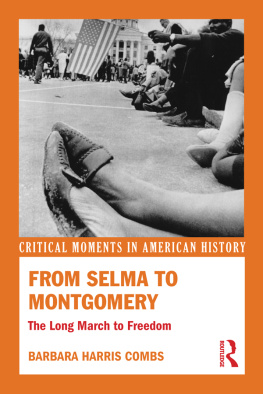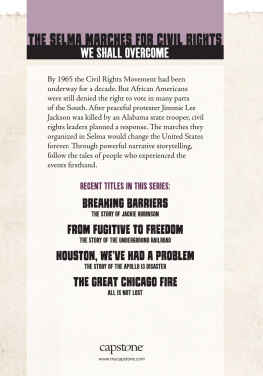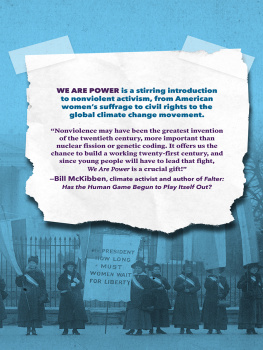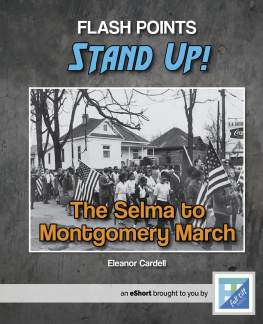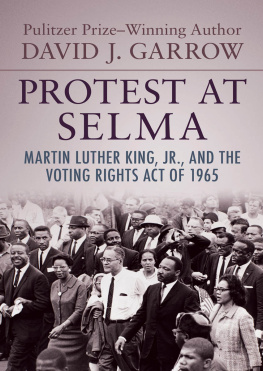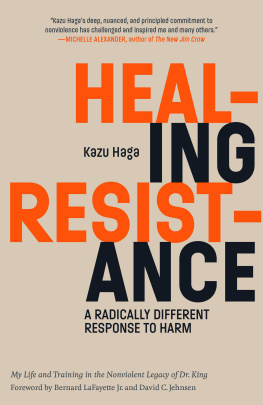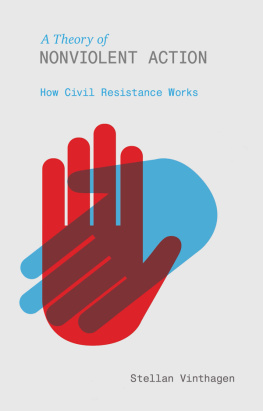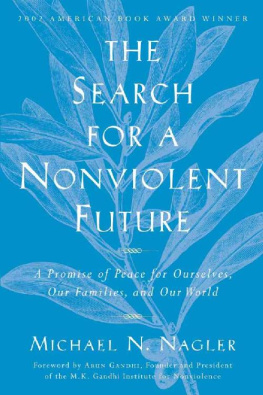Contents

Archetypal Nonviolence
Rene Moreau Cunningham's unique study utilizes the psychology of C. G. Jung and the spiritual teachings of Mahatma Gandhi and Martin Luther King, Jr. to explore how nonviolence works psychologically as a form of spiritual warfare, confronting and transmuting aggression.
Archetypal Nonviolence uses King's iconic march from Selma to Montgomery, a demonstration which helped introduce America to nonviolent philosophy on a mass scale, as a metaphor for psychological and spiritual activism on an individual and collective level. Cunningham's work explores the core wound of racism in America on both a collective and a personal level, investigating how we hide from our own potential for evil and how the divide within ourselves can be bridged. The book demonstrates that the alchemical transmutation of aggression through a nonviolent ethos, as shown in the Selma marches, is important to understand as a beginning to something greater within the paradox of human violence and its bedfellow, nonviolence.
Archetypal Nonviolence explores how we can truly transform hatred by understanding how it operates within. It will be of great interest to Jungian analysts and analytical psychologists in practice and in training, and to academics and students of Jungian and post-Jungian studies, American history, race and racism, and nonviolent movements.
Rene Moreau Cunningham is a Diplomate Jungian Analyst of the Inter-Regional Society of Jungian Analysts, Texas Chapter. She is a licensed Marriage and Family Therapist who has been in private practice for over twenty-seven years.
Some of the material contained herein is taken from a Taylor & Francis article entitled: The March from Selma to Montgomery and the Nonviolent Movement in Analysis, Psychological Perspectives, Los Angeles, California, Vol. 61, 2018, pp. 331343.
Book cover painting byZachariah Collins
This book is a study of the history of the racial dilemma in the United States. It includes the Civil Rights Movement and its leaders, such as Martin Luther King. It amplifies the theory of non-violence by using some of the writings of Gandhi and King and others. This work is important in studying the healing of psychological splitting, and I highly recommend it for any reader who is curious about these topics and is willing to think symbolically and metaphorically about them.
Ben F. Toole, Jungian Analyst, USA
In the face of the worldwide epidemic of violence, this book is historically timely. Rene Cunningham offers an important alternative to violence by demonstrating the value of the spiritual practice of nonviolence. The book's focus on the psychological underpinnings of nonviolence contributes to a greater understanding of exactly why nonviolence can be so effective.
Lionel Corbett, MD, Jungian Analyst, Pacifica Graduate Institute, USA
From the consulting room to the political scene we search for a container to hold the tension of the opposites. Following the path of nonviolence so aptly described by this author gives us the opportunity to experience and grow from this tension.
Billye Bob Currie, Jungian Analyst, USA
First published 2021
by Routledge
2 Park Square, Milton Park, Abingdon, Oxon OX14 4RN
and by Routledge
52 Vanderbilt Avenue, New York, NY 10017
Routledge is an imprint of the Taylor & Francis Group, an informa business
2021 Rene Moreau Cunningham
The right of Rene Moreau Cunningham to be identified as author of this work has been asserted by her in accordance with sections 77 and 78 of the Copyright, Designs and Patents Act 1988.
All rights reserved. No part of this book may be reprinted or reproduced or utilised in any form or by any electronic, mechanical, or other means, now known or hereafter invented, including photocopying and recording, or in any information storage or retrieval system, without permission in writing from the publishers.
Trademark notice: Product or corporate names may be trademarks or registered trademarks, and are used only for identification and explanation without intent to infringe.
British Library Cataloguing in Publication Data
A catalogue record for this book is available from the British Library
Library of Congress Cataloging-in-Publication Data
A catalog record has been requested for this book
ISBN: 978-0-367-11224-0 (hbk)
ISBN: 978-0-367-11226-4 (pbk)
ISBN: 978-0-429-02541-9 (ebk)
Typeset in Times New Roman
by Taylor & Francis Books
To Scott, for keeping the light on
The production of this book is due to the commitment of many people who have supported this endeavor. Thank you, Linda for your dreams and the sharing of parts of yourself in this book, which provide insight for all of us struggling to be understood by the other. I owe a huge debt of gratitude to Susan Rowland, Monika Wickman and Karen Hodges for suggesting and supporting this books publication. To Lionel Corbett, Billye-Bobb Currie, Ben and Donna Toole for their time, professional commitment and belief in the power of nonviolence. As Southerners, Billye and Ben give depth to the material through their vulnerability and continued wish for change in the greater South and in the country in general. I thank Ron Schenk for pushing me deeper into myself in the writing of the material. For their conversations and input, I thank Clayborne Carson, David Garrow, Sam Kimbles, Michael Vannoy Adams, Fanny Brewster, Mark Winborn, Laura Chapman, and Donna Robinson. Thank you to my editor at Routledge, Susannah Frearson for her faith and support in this project.
This book is an alchemical birth born from a childhood defined by the Vietnam War, racism in the South and the civil rights movement. My training as an analyst brought to bear the significant, ongoing complexes which defined my country then and now and continues to influence my own psyche as I further my becoming into a spiritual human being. To this end, there are all of those supervising and training analysts to thank at the Inter-Regional Society of Jungian Analysts; particularly those in the Texas and New Mexico chapters. Thank you to Susan Schwartz for always pointing the way. I thank Jacqueline West and Barry Williams for fortifying my anxiety and periods of despair with focus, purpose, hope and love. Finally, to my beautiful family: Scott, Carly and Max, I thank you for your love, humor, and honesty. And to my birth family, thank you for your ongoing support.
The clock above the Tallahatchie County Courthouse in Sumner, Mississippi is frozen at five minutes to twelve. The courthouse has long been shuttered, chained and deserted as evidenced by the spider webs clinging to the bars that frame the stairs leading up and into the courtroom. The courthouse stands in the center of the deserted square.
The surrounding stores are deserted except for one, a restaurant, while opened for business, is also empty. There are no humans present but for the few of us who have come to the Delta to pay tribute to Emmett Till, a fourteen-year-old African American boy, who had been beaten, shot and lynched in Money, Mississippi on August 28, 1955.
While it is September 2018, I feel as if I have stepped into a timeless void. The lifeforce of the town itself has been sucked dry, leaving only a petrified, pitiful shell of buildings and streets. It is here in summer, over fifty years earlier that Roy Bryant and his half-brother Milam celebrated their freedom when an all-male, all-white jury acquitted them for the lynching death of Emmett Till on September 23, 1955. While they and their wives smiled for the cameras, the outraged country began protesting the jurys decision. The acquittal also sparked what would become a general outrage over a multitude of unsolved, racially related murders which defined Bryant and Milams beloved Delta, and the greater American South.

